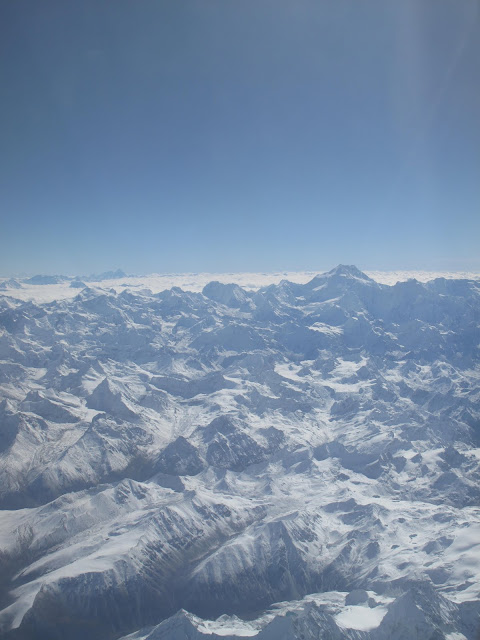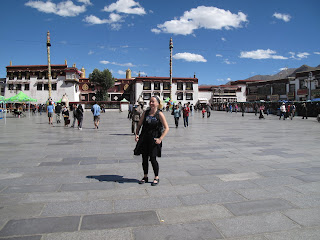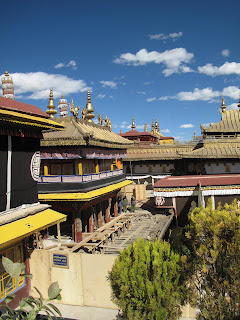This Christmas is the first i have spent in central London ever. So the perfect time to try something i had been meaning to do for a long time (and i'm sure everyone says that) - and that's "help the homeless at Christmas". A bit of a cliche maybe, but for a long time i've felt that the music business is way too cynical and self obsessed with the narcissistic and frankly unnecessary bureaucracy and mechanisms that forget the human element - and for me, especially coming from a background of doing Youth work and working with Young Carers sometimes it all feels a bit empty.
So i can safely say that it was with totally selfish motives i signed up to work at Crisis at Christmas this year. I signed up for 3 days 23, 26 and 27 December. Unfortunately i had a chest infection after all the hedonism of recent weeks and so didn't go on the 23rd. But i ended up going in on the last day the 29th too - so 3 days it was. And i think if i hadn't missed the 23rd i probably wouldn't have been ready for Christmas at my house - you know they say charity begins at home, and also i don't think i would have made friends with my new buddy Tara.
Crisis:
"Crisis is the national charity for single homeless people. We are dedicated to ending homelessness by delivering life-changing services and campaigning for change"
Crisis says:
"Homelessness is an isolating and destructive experience and homeless people are some of the most vulnerable and socially excluded in our society.Homelessness is a problem throughout the UK, although it is more prevalent in urban centres, especially in London.Homelessness is about more than rooflessness. A home is not just a physical space, it also has a legal and social dimension. A home provides roots, identity, a sense of belonging and a place of emotional wellbeing. Homelessness is about the loss of these. Homelessness is costly to the individual, society and the state."
Its actually quite relaxing to go and volunteer somewhere where Im not in charge and not responsible for what's going on. All i had to do was do the jobs allocated with a smile on my face, which mainly meant guarding entrances and exits and chatting. It was no trouble and not hard.In fact, there were a lot of volunteers there - more than the "guests" at times it seemed. I chose the Hammersmith Day centre because it was closest to me, but in actual fact it occurred to me when faced with the reality that a Day centre is possibly the opposite of what's needed - a night centre would be better! But there was Crisis night centres too... just not the Hammersmith one - and to be honest, that i was before i understood a little bit more.I'm a chatty person, if i wasn't i would have difficulty doing a radio show. So its natural for me to chat chat and make friends, and it doesn't bother me if they have a roof over their heads at night or not, its just a learning curve and maybe a way to spread some positivity.I've been very lucky to travel a lot this year, and everywhere i go i like to try and understand. I think its normal to want to understand, and it was no different with "guests" at Crisis. I don't want to fall into the volunteer trap who's desperate for juicy stories of hardship, but of course as soon as i made friends its normal to want to know about each other, and wonder how this happened. I don't think anyone would choose to be on the streets. But from what i understand, the longer you are on the streets, the more difficult it is to get off them.I suppose i should examine the terms i use, and people use to describe the homeless.The Homeless... just that term - ideas of a huge advancing or stationary army with fingerless gloves? One of the Crisis guests and my new friends i'll call him "A" for the purposes of this blog told me that some of his friends call themselves Tramps. But he doesn't say he's a tramp, he says he's unfortunate. He's just had a run of bad luck and been unfortunate with the way things have turned out.I say my new friends but it is very much a case of "us" and "them". You can't avoid the fact that there is a huge gulf between volunteers and guests. Us smarmy do-gooders and the people who are actually facing shit. Its easy really to take time out from University hols, office hols, Xmas hols to volunteer. I'm sure everyone volunteering was touched by the people they met and the things they saw. But the volunteers have the volunteer room that they go back to, and as we were reminded in the briefing everyday a fully stocked fridge to go home to."They" have no home.Every time i hear "they" and "them" in situations like this alarm bells ring. "Otherness" is a concept which permeates thought in situations of divison and doesn't aid moving forward in communication.But as we were told many times - "don't give out your phone number or personal details to guests, here at Crisis this week you have a safety net... outside in the big wide world you don't"It's inevitable however much you don't want the chasm to exist between "guests" and "volunteers", that it stands large in the room like an elephant no one points out; its there and we all know it. Volunteers might feel guilty about their affluent lifestyle, guests may feel embarrassed. There's a whole minefield of potential faux-pas to trip you up.However, the best thing to do is to go and be yourself and ignore that elephant as best you can, and in my opinion bring humour to the situation as much as possible.Homeless in French "Sans Abri" - Without shelter. I suppose metaphorically and physically its true.I remember watching a movie at University when studying the Nouveau vague or 80's cinema called "Sans toit ni loi" (without roof or law) which kept coming back to me this week. That film painted such a bleak horrid picture, with such a sense of hopelessness its hard not to think of it in terms of the people i've met and worry
There are a few "guests" that stand out to me who i had the pleasure of talking to a lot. And i can honestly say that i won't forget them. Firstly theres "J". A chap who Tara and I spoke to first of all. He appears now in retrospect slightly shady, but very well versed in politics and geography and economics. Mr. Commerce. He said he taught himself English from his 2 dictionaries he took with him when he left "The Soviet Union" English-Russian, and Russian-English. He sat with his 2 dictionaries in the library with a copy of Newsweek and TIME every day he said looking up words, and gradually learning to speak English.He taught himself Dutch when he got to The Netherlands from sitting in a train station, and asking passengers waiting for their train to help him read a paragraph of the Dutch newspaper.He taught himself French the same way.He has a flat in The Netherlands he said and will go back there soon.With a totally different temperament, and little to no interest in politics or commerce i suspect, unless to sell his paintings is "A"*A has a broken arm cause some arseholes jumped on it whilst he was asleep in Covent Garden. They kicked him in the face too. He likes being tickled. He likes talking about his paintings. Someone told him that he has real talent. He likes talking about posh people and taking the piss. He likes just chitchatting. He sleeps rough every night. He smiles all the time (pretty much). He likes a bit of drama.He kicked a bag of rubbish cause someone woke him up one morning too early. The bag of rubbish was full of bottles and he stubbed his toe. It still hurts.The day i didn't go to Crisis, i wondered about him, and looked forward to seeing him again, just like *DHere's my (bad) drawing of him:
What a sweetheart. First chatted about wrestling. Luckily because of Landphil i know a bit about it. *D likes the Undertaker
Especially his fight with Kane and when he came in on a bike.
*D loves the trains, that's where he sleeps at night. Trains or night buses.
He keeps himself to himself because he can't trust other people. Other homeless people steal his stuff he says. He has long fingernails that i looked at too much.
*D tells us he got into debt, owed too many people money, and can't face them now. I told him he should declare bankruptcy and sort it out. He said he thinks he's going to go and visit his parents for New Year, but he's scared they're mad at him. I hope he can sort it out, i hope i told him the right thing - visit Citizens advice bureau!
He's a real sweet guy, so clearly aware of the dangers on the streets
Although According to *G of A+G it's not as bad as i might think it is, if you know what you're doing.
I didn't realise how shelters worked until speaking to *G. There's 30 places, in a different venue every night in West London. A+G have a map. And 30 people turn up at 8pm have food and can sleep indoors on the floor of a church/hall/community centre. There are normally 10 people waiting outside to see if someone doesn't turn up. If you don't turn up by 8pm you lose your place.
You get turfed out at 7am and then A+G make a coffee last a long time in Maccy D's. A tea in a greasy spoon. The boredom, G tells me is a killer.
G was doing a degree in philosophy when he faced a series of unfortunate events. I dont know the nature of these events i never asked. But whether its because he's ashamed of his position or its just his way or ashamed of what happened or of the big elephant in the room G doens't look me in the eye alot, even though we spend a long time chatting over a few days. I tell him that i am curious about people everywhere, that i love to travel and find out about new cultures, and that sometimes i wonder if being street-wise translates as a culture, and if he can afford to look at people with curiousity. He tells me he tries to stay positive and not to pigeon hole or stereotype. Tries not to say "this person did this to me, and this person and this person, and they're all from the same place so that place must be bad". He grew up in West London, and when i ask him about safety on the streets, and tell him about what happened to me in Buenos Aires, and how i've thought a lot about it and if you know your territory you're always less vulnerable than a new comer - he told me its not as bad as i think out there and started talking to me about homeless people not being all bad. I said i didn't mean homeless people being bad, i meant the guys tanked up coming out the pub at 11pm looking for a fight. He told me that was why he always makes it by 8pm to the shelter, because its safer indoors at night time.
Without giving me any details - i didn't ask for any, or want any - we talk about what a short slippery slope of unfortunate events it is to end up on the streets. I've decided its a lot closer possibility than most people think.
And it seems to me, that the main thing, the main barrier which protects you is family.
When the going gets tough, its rare to find someone in local councils who will go out of their way for you, days of queuing make no difference, especially to a single male on a housing list.
Thats where irrespective of the elephant in the room, volunteers at places like Crisis can help, because its not a question of queuing, its a question of volunteers doing what they can, and as opposed to worrying about the chasm inside the centre, its more about working on the chasm that exists outside the shelter, as i can see without some of "our reality" the "street reality" becomes further and further away from hope, and what is needed to get off the streets.
Crisis was well worth doing, i will hope to do it again next year, not just because it made me think, but because there's a good bunch of people both sides of that chasm, and its well worth keeping your eyes open and not being ignorant to it, especially at Christmas*
So, Crisis! Thanks for letting me be involved! And for making new friends
:-)
*see other post!




















































